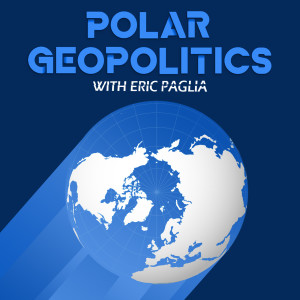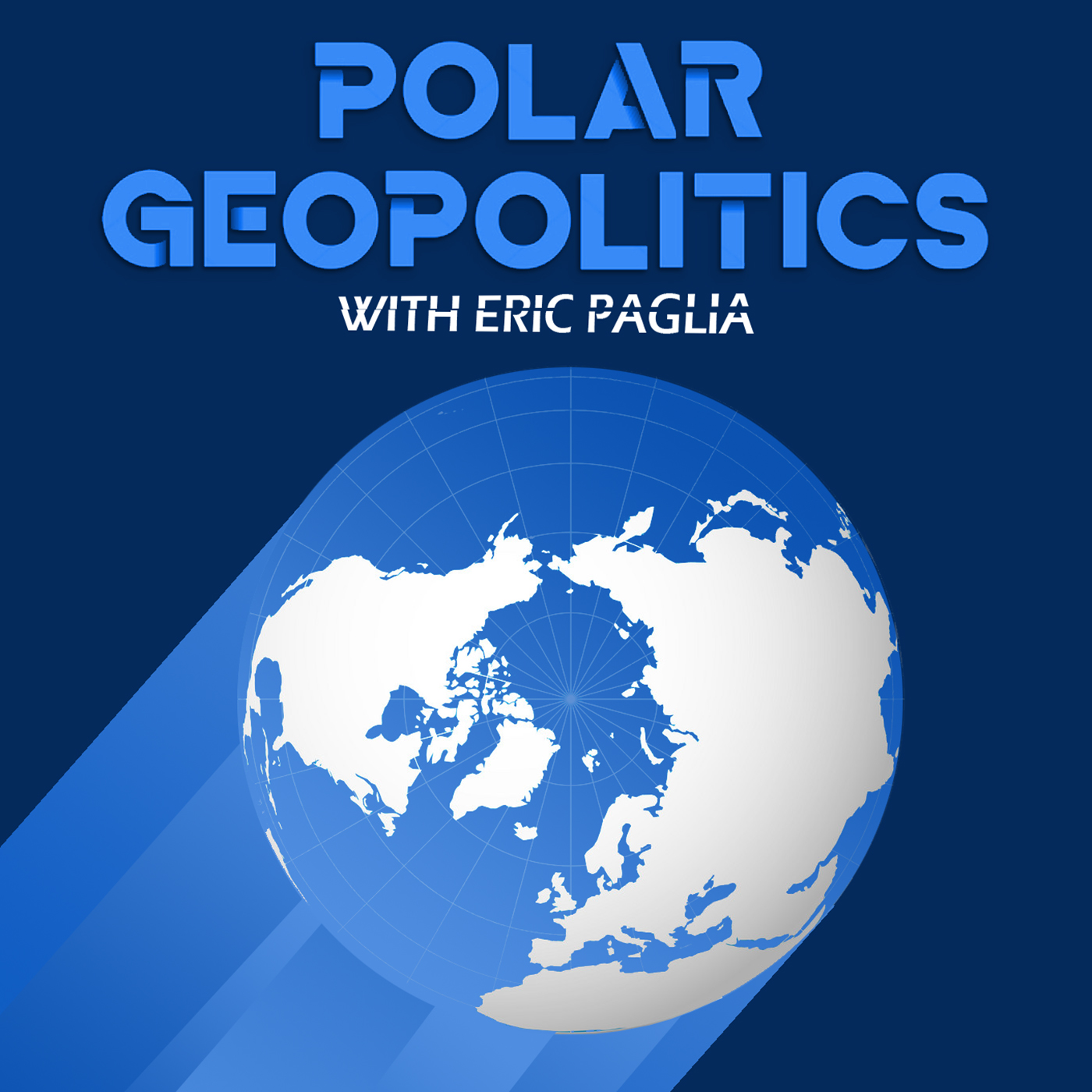Episodes

Monday Dec 30, 2024
Monday Dec 30, 2024
Arctic security, critical undersea infrastructure and Russian strategic calculations are in focus as Mathieu Boulègue joins the podcast to analyze the wider geopolitical consequences of recent events and upheavals in Ukraine, Syria, the Baltic Sea and beyond. Consulting Fellow with the Russia and Eurasia Programme at Chatham House, Boulègue discusses the effects of Russia’s war against Ukraine on its military posture in the Arctic, the introduction of North Korean troops into the war, Russia-China relations and possible collaboration on hybrid activities such as seabed cable sabotage, and how Donald Trump could impact the United States’ increasingly comprehensive Arctic engagement.
Mathieu Boulègue report for Wilson Center "Arctic Seabed Warfare against Data Cables": https://www.wilsoncenter.org/publication/arctic-seabed-warfare-against-data-cables-risks-and-impact-us-critical-undersea
Polar Geopolitics on Twitter / X: @polargeopol
Polar Geopolitics YouTube channel: https://www.youtube.com/@PolarGeopolitics
Polar Geopolitics on LinkedIn: https://www.linkedin.com/company/polargeopolitics
Polar Geopolitics on Facebook: https://www.facebook.com/polargeopolitics/
Polar Geopolitics website: http://www.polargeopolitics.com
Polar Geopolitics on Patreon: https://www.patreon.com/polargeopolitics
Polar Geopolitics on PayPal: https://www.paypal.com/donate/?hosted_button_id=KXUVZKGALMFXU

Monday Nov 18, 2024
Monday Nov 18, 2024
Many observers considered the 43rd annual CCAMLR meeting in Hobart a major disappointment due to the failure to renew important protections on krill fisheries and the continued lack of progress on marine protected areas in the Southern Ocean around Antarctica. Some are even concerned that the breakdown in consensus, centered on China and Russia refusing to extend existing or institute new protection measures, foreshadows greater geopolitical problems infecting Antarctic governance. To analyze the complexities of CCAMLR and what the meeting might portend for the future of the Antarctic Treaty System, Dr. Tony Press from the Institute for Marine and Antarctic Studies at the University of Tasmania joins the podcast, sharing insights from decades of direct involvement with the science and geopolitics of Antarctica as Australia’s former CCAMLR commissioner and chairman (2002-2006) of the Antarctic Treaty’s Committee for Environmental Protection.
Polar Geopolitics on Twitter / X: @polargeopol
Polar Geopolitics YouTube channel: https://www.youtube.com/@PolarGeopolitics
Polar Geopolitics on LinkedIn: https://www.linkedin.com/company/polargeopolitics
Polar Geopolitics on Facebook: https://www.facebook.com/polargeopolitics/
Polar Geopolitics website: http://www.polargeopolitics.com
Polar Geopolitics on Patreon: https://www.patreon.com/polargeopolitics
Polar Geopolitics on PayPal: https://www.paypal.com/donate/?hosted_button_id=KXUVZKGALMFXU

Friday Oct 04, 2024
Friday Oct 04, 2024
How does China exert influence in the Arctic, and has it already peaked? A new in-depth report published by the Wilson Center analyzes Chinese information and influence operations in each of the eight Arctic Council member states. The report’s co-author Adam Lajeunesse, associate professor at St. Francis Xavier University, joins the podcast to explain China’s multifaceted influence strategy in the Arctic and how it has gone about “selling” itself as a “near-Arctic state”—and whether Western observers have been too eager to buy in to this narrative and the ostensible threat China poses to the Arctic order. Dr. Lajeunesse also discusses the China-Russia relationship, China’s wolf warrior diplomacy, and how China has in recent years attempted to recalibrate its messaging and activities in the Arctic.
Selling the “Near Arctic State”: China’s Information and Influence Operations in the Arctic (Wilson Center 2024) by Adam Lajeunesse and P. Whitney Lackenbauer: https://www.wilsoncenter.org/publication/selling-near-arctic-state
Polar Geopolitics on Twitter / X: @polargeopol
Polar Geopolitics YouTube channel: https://www.youtube.com/@PolarGeopolitics
Polar Geopolitics on LinkedIn: https://www.linkedin.com/company/polargeopolitics
Polar Geopolitics on Facebook: https://www.facebook.com/polargeopolitics/
Polar Geopolitics website: http://www.polargeopolitics.com
Polar Geopolitics on Patreon: https://www.patreon.com/polargeopolitics
Polar Geopolitics on PayPal: https://www.paypal.com/donate/?hosted_button_id=KXUVZKGALMFXU

Friday Sep 27, 2024
Friday Sep 27, 2024
From geopolitical posturing surrounding the status of Belarus and Canada inside the Antarctic Treaty, to diverging views on science, environmental protection and the regulation of tourism, the 46thAntarctic Treaty Consultative Meeting in Kochi, India provided, in an era of great power competition and new constellations within the international system, a snapshot on the current state of affairs in the governance of Antarctica. Dr. Kati Lindström, a researcher at KTH in Stockholm and Estonia’s point of contact to the Antarctic Treaty who participated in ATCM 46 in India this past May, joins the podcast to analyze the outcomes and geopolitical implications of the latest annual meeting of the consultative parties to the Antarctic Treaty. An historian by training, Dr. Lindström also explains the geopolitical significance of cultural heritage remains in Antarctica for certain states, particularly those with historical claims in the continent.
Polar Geopolitics on Twitter / X: @polargeopol
Polar Geopolitics YouTube channel: https://www.youtube.com/@PolarGeopolitics
Polar Geopolitics on LinkedIn: https://www.linkedin.com/company/polargeopolitics
Polar Geopolitics on Facebook: https://www.facebook.com/polargeopolitics/
Polar Geopolitics website: http://www.polargeopolitics.com
Polar Geopolitics on Patreon: https://www.patreon.com/polargeopolitics
Polar Geopolitics on PayPal: https://www.paypal.com/donate/?hosted_button_id=KXUVZKGALMFXU

Thursday Sep 19, 2024
Arctic nation, or not? The Geopolitics of Arctic state identity
Thursday Sep 19, 2024
Thursday Sep 19, 2024
The eight member states of the Arctic Council each draw upon geography, history and other factors to promote their identity as an Arctic nation, while non-Arctic states seeking influence in the region use different—although sometimes similar—arguments to foster an image of being an Arctic stakeholder or, as in one prominent example, a “near-Arctic state”. The author of the forthcoming book Arctic State Identity – Geography, History and Geopolitical Relations (Manchester U.P. 2025), Dr. Ingrid Medby of Newcastle University, joins the podcast to discuss the processes, geopolitics and inclusion/exclusion dynamics of Arctic state identity construction.
Polar Geopolitics on Twitter / X: @polargeopol
Polar Geopolitics YouTube channel: https://www.youtube.com/@PolarGeopolitics
Polar Geopolitics on LinkedIn: https://www.linkedin.com/company/polargeopolitics
Polar Geopolitics on Facebook: https://www.facebook.com/polargeopolitics/
Polar Geopolitics website: http://www.polargeopolitics.com
Polar Geopolitics on Patreon: https://www.patreon.com/polargeopolitics
Polar Geopolitics on PayPal: https://www.paypal.com/donate/?hosted_button_id=KXUVZKGALMFXU

Wednesday Aug 28, 2024
Spotlight on Svalbard: Realities and myths in a microcosm of Arctic geopolitics
Wednesday Aug 28, 2024
Wednesday Aug 28, 2024
Although a unique set of circumstances characterize Svalbard, belonging to Norway under a 1920 treaty, the situation there reflects many of the major trends—and faultlines—in Arctic geopolitics. From science diplomacy and security to geoeconomics and great power competition, the High Arctic archipelago, where both Norway and Russia maintain permanent settlements and an array of non-Arctic states are active through long-term research programs, provides a useful lens for analyzing some of the key issues at stake in the contemporary Arctic. Dr. Andreas Østhagen, Senior Researcher at the Fridtjof Nansen Institute, joins the podcast for a comprehensive discussion that encompasses the new Norwegian white paper on Svalbard, the interest of China and India and other countries present there, the relevant international legal regimes and Russian hybrid activities in and around the archipelago. For those wanting to learn more about Svalbard, this 90-minute episode, centered on Østhagen’s extensive research and expertise, serves as a crash course on one of the most complex and fascinating areas of Arctic geopolitics.

Monday Jun 17, 2024
Monday Jun 17, 2024
Science and expert knowledge are pivotal for meeting many of the environmental challenges, economic opportunities and geopolitical imperatives of the contemporary Arctic. The Arctic Frontiers conference reflects this fact through its selection of seven scientific themes that serve as pillars for the annual event held every January in Tromsø, Norway. Not only natural science, the needed expertise ranges from politics and geopolitics, green technologies, indigenous knowledge, history and socials science, geoeconomics, community resilience and climate adaptation. Dr. Jenny Turton, Senior Advisor in charge of developing the science program for Arctic Frontiers, joins the podcast to present the scientific themes for the Conference in 2025, and provide an overview of some of the most pressing issues currently facing the Arctic that have informed the selection process.
Polar Geopolitics on Twitter / X: @polargeopol
Polar Geopolitics YouTube channel: https://www.youtube.com/@PolarGeopolitics
Polar Geopolitics on LinkedIn: https://www.linkedin.com/company/polargeopolitics
Polar Geopolitics on Facebook: https://www.facebook.com/polargeopolitics/
Polar Geopolitics website: http://www.polargeopolitics.com
Polar Geopolitics on Patreon: https://www.patreon.com/polargeopolitics
Polar Geopolitics on PayPal: https://www.paypal.com/donate/?hosted_button_id=KXUVZKGALMFXU

Friday May 17, 2024
Friday May 17, 2024
Reports of Russia’s discovery of huge oil reserves in Antarctic waters has caused concern in some quarters over (frozen) territorial claims and the future of the Protocol on Environmental Protection to the Antarctic Treaty, which permanently bans mining in and around the continent. Prof. Klaus Dodds, whose recent testimony for a UK parliamentary inquiry sparked a media firestorm over Russia’s activities and intentions in Antarctica, joins the podcast to discuss what he sees as classic grey zone tactics where, in this case, scientific research could possibly serve as a pretense for the pursuit of economic and geopolitical interests. Prof. Dodds also clarifies some common misconceptions over the significance of 2048 for the Antarctic Treaty, analyzes Antarctic geopolitics in the context of great power competition between China, Russia and the US, and shares ideas on how countries such as the UK—which is scheduled to release its first Antarctic strategy this autumn—can raise awareness and engage the public on increasingly important issues surrounding the polar regions.

